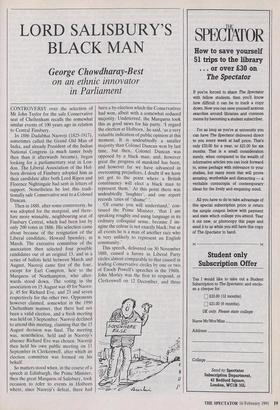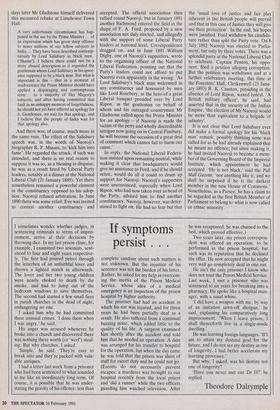LORD SALISBURY'S BLACK MAN
George Chowdharay-Best on an ethnic innovator in Parliament
CONTROVERSY over the selection of Mr John Taylor for the safe Conservative seat of Cheltenham recalls the somewhat similar events of 100 years ago in relation to Central Finsbury.
In 1886 Dadabhai Naoroji (1825-1917), sometimes called the Grand Old Man of India, and already President of the Indian National Congress (a much tamer body then than it afterwards became), began looking for a parliamentary seat in Lon- don. The Liberal Association of the Hol- born division of Finsbury adopted him as their candidate after both Lord Ripon and Florence Nightingale had sent in letters of support. Nonetheless he lost this tradi- tionally safe Conservative seat to a Colonel Duncan.
Then in 1888, after some controversy, he was adopted for the marginal, and there- fore more winnable, neighbouring seat of Finsbury Central, which had been lost by only 200 votes in 1886. His selection came about because of the resignation of the Liberal candidate, Howard Spensley, in March. The executive committee of the association then selected four possible candidates out of an original 13, and in a series of ballots held between March and August, Naoroji came first of the four, except for Earl Compton, heir to the Marquess of Northampton, who after- wards stood down. The voting in the association on 15 August was 49 for Naoro- ji, 45 for Richard Eve, and 23 and seven respectively for the other two. Opponents however claimed, somewhat in the 1990 Cheltenham manner, that there had not been a valid election, and a fresh meeting was held on 3 September. Naoroji declined to attend this meeting, claiming that the 15 August decision was final. The meeting was, nonetheless, held and in Naoroji's absence Richard Eve was chosen. Naoroji then held his own public meeting on 11 September in Clerkenwell, after which an election committee was formed on his behalf.
So matters stood when, in the course of a speech at Edinburgh, the Prime Minister, then the great Marquess of Salisbury, took occasion to refer to events in Holborn where, since Naoroji's defeat, there had been a by-election which the Conservatives had won, albeit with a somewhat reduced majority. Undeterred, the Marquess took this as good news for his party. `I regard the election at Holborn,' he said, 'as a very valuable indication of public opinion at this moment. It is undoubtedly a smaller majority than Colonel Duncan won by last time, but then, Colonel Duncan was opposed by a black man; and, however great the progress of mankind has been, and however far we have advanced in overcoming prejudices, I doubt if we have yet got to the point where a British constituency will elect a black man to represent them.' At this point there was undoubtedly 'laughter', and one report records 'cries of "shame" '.
'Of course you will understand,' con- tinued the Prime Minister, 'that I am speaking roughly and using language in its ordinary colloquial sense, because I im- agine the colour is not exactly black; but at all events he is a man of another race who is very unlikely to represent an English community.'
This speech, delivered on 30 November 1888, caused a furore in Liberal Party circles almost comparable to that caused in leading Conservative circles by one or two of Enoch Powell's speeches in the 1960s. John Morley was the first to respond, at Clerkenwell on 12 December, and three days later Mr Gladstone himself delivered this measured rebuke at Limehouse Town Hall: A very unfortunate circumstance has hap- pened in the use by the Prime Minister.., of an expression which has given deep offence to many millions of our fellow subjects in India ... They have been described contemp- tuously by Lord Salisbury as black men. ('Shame'). I believe there could not be a more absurd description as it regarded the gentleman whom Lord Salisbury in his ignor- ance supposed to be a black man. But what is important is this — that in a moment of inadvertence the Prime Minister should have applied a disparaging and contemptuous term ... to a majority of Her Majesty's subjects, and after having committed that fault in an unhappy moment of forgetfulness, he should not yet have offered an apology for it. Gentlemen, we wait for that apology, and I believe that the people of India wait for that apology also.
And there was, of course, much more in the same vein. The effect of the Salisbury speech was, in the words of Naoroji's biographer R. P. Masani, to 'kick him into fame'. He regarded the attack, if such was intended, and there is no real reason to suppose it was so, as a blessing in disguise; he was as a result feted by Liberal Party leaders, notably at a dinner at the National Liberal Club (21 January 1889). Yet there nonetheless remained a powerful element in the constituency opposed to his adop- tion. Naoroji refused arbitration. In June 1890 there was some relief; Eve was invited to contest another constituency and accepted. The official association then rallied round Naoroji, but in January 1891 another Richmond entered the field in the shape of F. A. Ford, proposed by a new association not duly elected, and allegedly with the support of some Liberal Party leaders at national level. Correspondence dragged on, and in June 1891 William Digby, one of Naoroji's supporters, wrote to the organising officer of the National Liberal Federation, pointing out that the Party's leaders could not afford to put Naoroji even apparently in the wrong. 'As Lord Salisbury's black man welcomed in any constituency and honoured by men like Lord Rosebery, as the hero of a great Liberal banquet presided over by Lord Ripon, as the gentleman on behalf of whom and his outraged countrymen Mr Gladstone called upon the Prime Minister for an apology — if Naoroji is made the victim of the petty and wholly discreditable intrigue now going on in Central Finsbury, he will become the occasion of a great deal of comment which cannot fail to harm our cause.'
In reply, the National Liberal Federa- tion insisted upon remaining neutral, while making it clear that headquarters would give no assistance to Ford, and if he should retire, would do all it could to drum up support for Naoroji. Naoroji's supporters were unconvinced, especially when Lord Ripon, who had now taken over as head of the Party, advised him to find another constituency. Naoroji, however, was deter- mined to fight on. He had no fear but that the 'usual love of justice and fair play inherent in the British people will prevail and that in this case of Justice they will give me their protection'. In the end, his hopes were justified. Ford withdrew his candida- ture rather than split the Party vote. On 6 July 1892 Naoroji was elected to Parlia- ment, but only by three votes. There was a splendid party at the National Liberal Club to celebrate. Captain Penton, his oppo- nent, filed a petition alleging corruption. But the petition was withdrawn and at a further celebratory meeting, this time at the Foresters' Hall, Clerkenwell (23 Janu- ary 1893) R. K. Causton, presiding in the absence of Lord Ripon, waxed lyrical. 'A British military officer', he said, had asserted that in the security of the Indian Empire, 'the election of Mr Naoroji would be more than equivalent to a brigade of infantry'.
It is not clear that Lord Salisbury ever did make a formal apology for his 'black man' remark, possibly thinking none was called for as he had already explained that he meant no offence; but since making it, he had invited Naoroji to become a mem- ber of the Governing Board of the Imperial Institute, which appointment he had accepted. 'He is not black,' said the Pall Mall Gazette, 'nor anything like it, and we shall be surprised if he is the darkest member in the new House of Commons.' Nonetheless, as a Parsee, he has a claim to be regarded as the first British Member of Parliament to belong to what is now called an ethnic minority.



















































 Previous page
Previous page